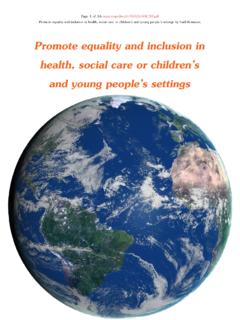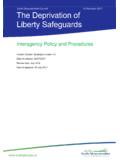Transcription of Engage in personal development in health, - Free
1 SHC 32 - Engage in personal development in health , social care or children s and young people s settings by Ga l Romanet Page 1 of 20 Engage in personal development in health , social care or children s and young people s settings Level 3 Diploma in health and Social care Unit SHC32 Author note: Although I finished the SHC22 unit, I decided to answer to all the SHC32 questions, according to my senior care assistant position. SHC 32 - Engage in personal development in health , social care or children s and young people s settings by Ga l Romanet Page 2 of 20 Assignment task SHC 32 - Engage in personal development in health , social care or children s and young people s settings Unit purpose and aim This unit is aimed at those who work in health or social care settings or with children or young people in a wide range of settings.
2 The unit introduces the concepts of personal development and reflective practice which are fundamental to such roles, and ways to implement these. Unit summary This unit is aimed at those who work in health or social care settings or with children or young people in a wide range of settings. The unit considers personal development and reflective practice, which are both fundamental to such roles. SHC 32 - Engage in personal development in health , social care or children s and young people s settings by Ga l Romanet Page 3 of 20 1 Understand what is required for competence in own work role Explain the function and importance of a job description.
3 Describe the main role and responsibilities you have as detailed in your job description Explain your wider understanding of the relevant standards expected of social care workers and identity which standards guide your practice. Exemplification: Standards may include; codes of practice; regulations; minimum standards; national occupational standards; competence 2 Be able to reflect on practice Explain why it is important to use reflective practice to help improve your understanding and the quality of your practice Explain the process of reflection as part of the Kolb Learning cycle Explain why your own personal values, experience and belief systems can affect your approach, attitudes and working practice and how to address issues 3 Be able to evaluate own performance Explain how you evaluate your own knowledge.
4 Understanding and performance in your work setting against the national standards expected of your role Explain the importance of using feedback to inform and improve your practice and the benefits gained from feedback. What are the sources of your feedback? 4 Be able to agree a personal development plan. A personal development plan may have a different name but will record information such as agreed objectives for development , proposed activities to meet objectives, timescales for review, etc. What sources of support are available to you for the planning and reviewing of your own knowledge and development ?
5 Exemplification: Sources of support may include; formal support; informal support; supervision; appraisal; within the organisation; beyond the organisation. , Explain own process used at work to identify your development needs and develop a personal development plan. Exemplification: Others may include; the individual, carers, advocates, supervisor, line manager or employer, other professionals. SHC 32 - Engage in personal development in health , social care or children s and young people s settings by Ga l Romanet Page 4 of 20 5 Be able to use learning opportunities and reflective practice to contribute to personal development , Provide 2 examples of recent learning and development activities you have participated in and discuss your preferred learning style and how the learning experience helped improve your knowledge and practice.
6 Explain the methods used to record information and your progress towards your personal and professional development . What is personal development ? personal development is a lifelong process. It's a way for people to assess their skills and qualities, consider their aims in life and set goals in order to realise and maximise their potential. SHC 32 - Engage in personal development in health , social care or children s and young people s settings by Ga l Romanet Page 5 of 20 Assignment task SHC32 Answers 1 Understand what is required for competence in own work role Explain the function and importance of a job description.
7 Describe the main role and responsibilities you have as detailed in your job description I am working for Bupa. The function and importance of my job description working as a senior care assistant tell me what I need to do, but it does not tell me how I need to do it. To find out, I need to look at the Standards (work description that contains all information I need to do my job) that apply to my senior care assistant role. National Occupational Standards explain what I need to know to work effectively in a social care sector as a senior care assistant. The National Occupational Standards form the basis for all the qualifications in the social care sector, and are divided into units of competence.
8 Some of these are mandatory (SHC31; SHC32; SHC33; SHC34; HSC024; HSC025; HSC036; HSC037; HSC038), and everyone should be able to demonstrate competence in these areas. Other units are optional and I should be able to demonstrate competence in those units according to my senior care assistant role working with individuals living with early dementia. Also, in performing my job, I have to show competences, which mean to show that I am able to provide evidences to demonstrate my skills and my knowledge contained in the National Occupational Standards. It is important to understand that competences are not only about doing my job; it is also about to understand why I do what I do in relation to the basis that are the foundation of my senior care assistant role.
9 Senior care Assistant: Job Purpose At Bupa we expect employees to give their personal best and strive for continuous improvement to ensure the highest standards of care and service and delivered to all customers. The post holder is responsible and accountable for the well-being of residents within the care home ensuring that their physical, emotional and social needs are met, whilst helping to achieve their full capabilities. Provide leadership to the team to ensure safe, smooth and efficient running of the care home in accordance with the policies of the company and the registering authority guidelines.
10 SHC 32 - Engage in personal development in health , social care or children s and young people s settings by Ga l Romanet Page 6 of 20 In my health and social care workplace for individuals living with early dementia, my job description regarding the main role and responsibilities working as a senior care assistant are the following: Accountabilities: Clinical Practice: To manage communication with all residents, relatives, staff, other professionals and involved in the care of the residents; to assess, develop, implement and evaluate individualised resident care , ensuring consultation with and involvement from residents, GP s, relatives and carers; to participate fully in the overall care of the residents as per the personal plan, ensuring all records are accurate and thorough in accordance with registration and legal requirements; monitor work areas and practices to ensure they are safe and free from hazards and conform to health , safety and security legislation, policies, procedures and guidelines.






